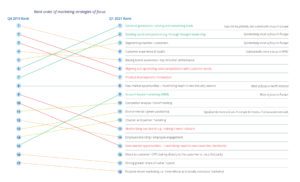
Michael McLaren
The COVID-19 pandemic rapidly accelerated the digital transformation plans of B2B organizations as they felt the pressure to keep up in the race towards digital readiness. The speed of change, the shift towards greater marketing technology sophistication and heightened customer expectations have resulted in greater complexity and demands of the marketing function than ever before. How is it best to cut through the noise in the extremely crowded digital ecosystem? Where is there potential to capture more value, especially given growing customer demands and the relentless rise of digital self-serve systems?

Julia Doheny
For increased efficiency, B2B brands are expected to automate more while winning and engaging customers in a more personal and relevant way. As market dynamics continue to evolve, B2B marketers are required to demonstrate greater returns with more accountable data-driven ROI. Consequently, marketers are hungry for evidence-based insights to inform decisions and justify actions.
B2B International, the B2B market research specialist within Merkle B2B, has conducted a marketing pulse for the past seven years among marketing leaders of the most influential B2B brands. This year’s study reveals the three key growth opportunities that B2B brands must embrace to thrive post-pandemic:
Brand impact—crafting a more visible and compelling brand position that drives demand.
Emotional impact—seeking emotional engagement with customers and connecting with them via more personalized and relevant messaging for deeper brand affinity.
CX impact—striving towards customer experience excellence to deliver higher customer lifetime value.
Brand Impact
Digital transformation has given rise to the empowered customer in that B2B suppliers have experienced a shift from mostly brand-driven touchpoints (like direct marketing and account reps) to customer-driven touchpoints where the customer drives the interaction (such as through social media, search and online reviews). B2B providers have therefore had to make the pivot from a brand-first to audience-first strategy, engaging customers in the right place at the right time with the right message. This has become increasingly difficult in the crowded, digital-first ecosystem, reflected by the poor perception of their performance by B2B brands:
Not surprisingly, therefore, brand to demand has become top of mind for B2B marketers, with demand generation the top-ranked strategy of focus right now out of 18 strategies tested, followed by building the brand position. The B2B brands that stand out from the crowd with a compelling value proposition tailored to different customer types are those that will ultimately win.

Emotional Impact
In the digital-first world, business-to-business has become increasingly person-to-person in that it is real people (versus organizations) that choose, approve and use products and services. Real people with real expectations and real emotions. So, unlike the corporate entities for which they work, these people have attitudes and feelings that have a strong influence on their decisions and behaviors. Research by B2B International has shown that 56% of the final purchase decision is based on emotional factors like confidence in the provider and trust in their credibility.
Furthermore, research has proven that emotionally connected customers are more than twice as valuable as highly satisfied customers as they engage more with the brand, are more receptive to communications, buy more, exhibit less price sensitivity, and spread more positive word of mouth.
Yet, a staggering 54% of B2B brands struggle to connect with customers on an emotional level to drive higher brand engagement, and 49% of B2B brands are challenged in delivering marketing communications and messaging in a more personalized and relevant way. At the same time, 81% of B2B marketing decision-makers expect personalized marketing to be significantly or somewhat influential on their marketing strategies, so those that leverage emotional drivers will undoubtedly overtake their peers. Knowledge-based verticals (such as IT/software/electronics, financial services and professional/business services) are currently more focused on connecting with customers on an emotional level to drive higher brand engagement.
CX Impact
The effect of the pandemic on the customer experience includes increased expectations around speed and value for money, along with a digital-first engagement that is often absent of human interaction. In light of this, the top two challenges being addressed by B2B brands this year are:
- Building/strengthening customer relationships in a digital world (a challenge to 55%); and
- Delivering an excellent CX throughout the entire customer lifecycle (a challenge to 53%).
Customer experience leaders—defined as those who excel in being committed to making customers feeling valued and making life easier for the customer—account for only 22% of B2B brands. These leaders are more committed to digitally advancing the customer experience in that 73% of them have a formalized roadmap with sufficient budget for investing in the digital transformation of the customer experience over the next 1-2 years.
The impact of technology on marketing effectiveness and improving the customer experience is significant. Personalized marketing (e.g., tailoring communications and content to individuals) and AI (e.g., intelligent chatbots and personalization) saw the biggest increases between 2019 and 2021 in terms of influencing marketing strategies and practices (overall, 81% and 57% seeing an impact, respectively).
Companies that are true CX leaders are also significantly more likely than their counterparts to measure loyalty through a richer and more comprehensive set of data—including customer satisfaction data, customer lifetime value, and brand alignment with customer values. This shows that true customer-centricity extends far beyond the customer experience to encompass total experience management.
Map the customer journey in the new normal
The relatively mediocre performance of B2B organizations and their challenges delivering impactful brand and customer experiences in our digital-first world highlight huge opportunity for B2B brands to overtake their competitors. The following three considerations indicate how B2B marketers can get ahead:
Customer behaviors have changed with greater familiarity and the substantial increase of digital touchpoints, from where the buyer moves further and further into a “self service” world – seeking information in the path-to-purchase to how they evaluate suppliers and interact with vendors. The more savvy B2B brands are those that understand how to best reach and influence customers throughout the journey in the right place at the right time, including the optimal digital touchpoints to leverage and how they play a role in the broader omnichannel experience.
The best-in-class B2B firms are those that deliver hyper-relevant, personalized experiences tailored to real people behind the digital touchpoints, and with messaging that is empathetic to individual pain points and desires. This requires a recognition that we have an ongoing relationship with our customers and demands a deep understanding of the personas served, along with the appropriate tools and platforms to consolidate and leverage customer data.
Focus on long-term customer-centricity over quick wins.
The impact of the pandemic has led B2B organizations to seek more immediate returns with the biggest focus on demand generation, but the most successful B2B brands are those that invest in the total experience, recognizing that the greater payback comes from long-term customer lifetime value. The CX leaders know how to wow the customer through the likes of real-time responsiveness, personalization and AI-driven product recommendations, and they are more sophisticated in the loyalty metrics used to measure and improve customer-centricity.
The survey was run by B2B International in Q1 of 2021. The sample size comprised n=301 marketing, insight, CX and business strategy decision-makers across brands serving B2B audiences and focused on large businesses (the average revenue was $2.9 billion). The sample is international: 36% North America (predominantly U.S.); 40% Europe (predominantly UK & Germany); 24% APAC (Singapore & Australia). The full results of the survey are available on the B2B International website.
Michael McLaren is the Global CEO of marketing agency Merkle B2B. Prior to Merkle, McLaren held several executive positions at marketing services firm McCann Worldgroup, including president of ad agency McCann Erickson US and the dual role of CEO of McCann Worldgroup Japan and regional president of McCann Worldgroup Asia-Pacific.
Julia Doheny is President, Research, North America, at B2B International USA, Inc., a part of the Merkle B2B group of agencies and the global B2B market research firm in the Dentsu Aegis Network. She has led numerous research programs informing the business, brand and marketing strategies of more than 100 B2B companies spanning mainly finance, technology, manufacturing and construction sectors.
Favorite